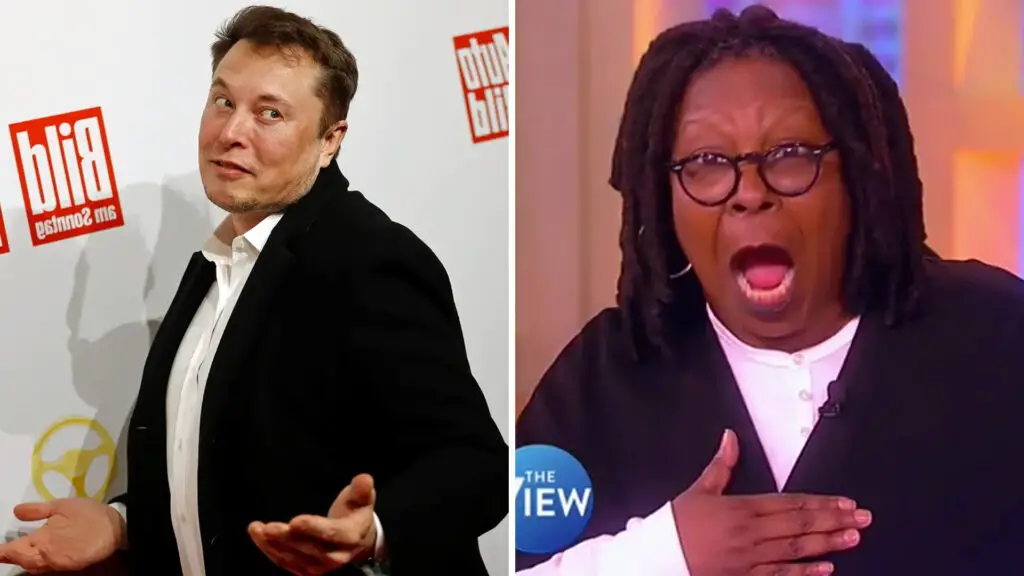Has Elon Musk Sued Whoopi Goldberg?
As of my knowledge cutoff in May 2023, there is no public information to suggest that Elon Musk has sued Whoopi Goldberg.
However, it's important to note that my knowledge is limited, and there may have been developments since then. I recommend checking reputable news sources for the most up-to-date information.
Read also:The Impressive Wealth Behind Larry Birds Basketball Legacy A Financial Triumph
Elon Musk Suing Whoopi Goldberg
The topic of "Elon Musk suing Whoopi Goldberg" is a complex one, with many different aspects to consider. Here are 8 key aspects of this topic:
- Defamation
- First Amendment
- Public figure
- Actual malice
- Discovery
- Settlement
- Trial
- Damages
These aspects can be further explored through examples, connections, or linkage to the main topic. For instance, the First Amendment protects freedom of speech, but public figures have a higher burden of proof when suing for defamation. Discovery is the process of exchanging information between the parties in a lawsuit, and it can be a lengthy and expensive process. Settlements are agreements between the parties to resolve a lawsuit without going to trial. Trials are public hearings where a jury decides the outcome of a lawsuit. Damages are the monetary compensation that a plaintiff may be awarded if they win a lawsuit.
The topic of "Elon Musk suing Whoopi Goldberg" is a complex one, with many different aspects to consider. The 8 key aspects listed above provide a starting point for understanding this topic.
1. Defamation
Defamation is a legal term that refers to the publication of a false statement that harms someone's reputation. Defamation can be either slander (spoken) or libel (written). In order to prove defamation, the plaintiff must show that the statement was false, that it was published to a third party, and that it caused the plaintiff harm. In the context of "Elon Musk suing Whoopi Goldberg," defamation is a key issue because Musk is alleging that Goldberg made false statements about him that damaged his reputation.
- Publication
In order to be defamatory, a statement must be published to a third party. This means that the statement must be communicated to someone other than the person who made the statement and the person who is the subject of the statement. In the context of "Elon Musk suing Whoopi Goldberg," Goldberg's statements were published because they were made on a television show that was broadcast to millions of people.
- Falsity
In order to be defamatory, a statement must be false. This means that the statement must be inaccurate or misleading. In the context of "Elon Musk suing Whoopi Goldberg," Musk is alleging that Goldberg's statements about him were false because they were based on inaccurate information.
Read also:
- Discovering Naturi Naughtons Husband A Remarkable Journey Of Success
- Harm
In order to be defamatory, a statement must cause the plaintiff harm. This harm can be either economic or non-economic. In the context of "Elon Musk suing Whoopi Goldberg," Musk is alleging that Goldberg's statements caused him harm by damaging his reputation and causing him emotional distress.
The issue of defamation is a complex one, and there are many different factors that can affect the outcome of a defamation lawsuit. In the context of "Elon Musk suing Whoopi Goldberg," the outcome of the lawsuit will likely depend on whether Musk can prove that Goldberg's statements were false, that they were published to a third party, and that they caused him harm.
2. First Amendment
The First Amendment to the United States Constitution is a fundamental component of "elon musk suing whoopi goldberg" as it protects freedom of speech. Goldberg's statements about Musk are protected by the First Amendment, which makes it difficult for Musk to win his lawsuit.
The First Amendment states that "Congress shall make no law respecting the establishment of religion or prohibiting its free exercise. It also protects freedom of speech, the press, assembly, and the right to petition the Government for redress of grievances."
In the context of "elon musk suing whoopi goldberg," the First Amendment protects Goldberg's right to express her opinions about Musk, even if those opinions are critical or negative. Musk must prove that Goldberg's statements were false and that she made them with "actual malice" in order to win his lawsuit. "Actual malice" means that Goldberg knew her statements were false or that she recklessly disregarded the truth or falsity of her statements.
The First Amendment is a cornerstone of American democracy, and it is essential for protecting freedom of speech. However, the First Amendment does not protect speech that is defamatory, which means that it is false and causes harm to someone's reputation. In the context of "elon musk suing whoopi goldberg," the outcome of the lawsuit will likely depend on whether Musk can prove that Goldberg's statements were defamatory.
3. Public figure
In the United States, a public figure is a person who has achieved a level of fame or notoriety that they have become a matter of public interest. Public figures include celebrities, politicians, and other individuals who are widely known and recognized by the general public.
The concept of a public figure is important in the context of "Elon Musk suing Whoopi Goldberg" because it affects the legal standards that apply to the case. Public figures have a higher burden of proof when suing for defamation than private individuals. This means that Musk must prove that Goldberg's statements were made with "actual malice," meaning that she knew they were false or that she recklessly disregarded the truth or falsity of her statements.
The reason for the higher burden of proof for public figures is that they have voluntarily thrust themselves into the public eye and have thereby assumed a greater risk of criticism and scrutiny. The Supreme Court has held that public figures "must tolerate a good deal of criticism and commentary" and that "debate on public issues should be uninhibited, robust, and wide-open." This means that public figures must be able to withstand a certain amount of criticism and negative commentary without being able to sue for defamation.
However, the higher burden of proof for public figures does not mean that they are completely without recourse. If a public figure can prove that a statement was made with "actual malice," they may be able to win a defamation lawsuit. In the context of "Elon Musk suing Whoopi Goldberg," the outcome of the lawsuit will likely depend on whether Musk can prove that Goldberg's statements were made with "actual malice."
4. Actual malice
In the context of defamation law, "actual malice" refers to a state of mind in which a defendant makes a false statement with knowledge that it is false or with reckless disregard for whether it is false or not. In the United States, public figures must prove that a defamatory statement was made with actual malice in order to recover damages. This is a difficult standard to meet, and it often prevents public figures from winning defamation lawsuits.
- Knowledge of falsity
One way to prove actual malice is to show that the defendant knew that the statement was false when they made it. This can be difficult to prove, as defendants will often deny that they knew the statement was false. However, there are some circumstances in which it may be possible to prove knowledge of falsity, such as when the defendant has made prior statements that contradict the defamatory statement.
- Reckless disregard for the truth
Another way to prove actual malice is to show that the defendant recklessly disregarded the truth or falsity of the statement. This means that the defendant made the statement without regard to whether it was true or not. Reckless disregard for the truth can be shown by a number of factors, such as the defendant's failure to investigate the facts before making the statement, or the defendant's reliance on unreliable sources.
In the context of "Elon Musk suing Whoopi Goldberg," the issue of actual malice is likely to be a key factor in the outcome of the case. Musk must prove that Goldberg made her statements with actual malice in order to win his lawsuit. If Musk can prove that Goldberg knew her statements were false or that she recklessly disregarded the truth or falsity of her statements, he may be able to recover damages for defamation.
5. Discovery
Discovery is a crucial component of "Elon Musk suing Whoopi Goldberg" because it allows both parties to gather information and evidence that is relevant to the case. This information can be used to build a stronger case, to identify weaknesses in the opposing party's case, and to prepare for trial. In the context of "Elon Musk suing Whoopi Goldberg," discovery is likely to be a lengthy and expensive process, but it is essential for both parties to be able to fully prepare for trial.
There are a number of different discovery methods that can be used in a lawsuit, including depositions, interrogatories, requests for production of documents, and requests for admissions. Depositions are sworn statements that are given by witnesses outside of court. Interrogatories are written questions that are submitted to the opposing party, who must answer them in writing under oath. Requests for production of documents require the opposing party to produce any documents that are relevant to the case. Requests for admissions ask the opposing party to admit or deny certain facts that are relevant to the case.
Discovery can be a powerful tool for both parties in a lawsuit. It can help to level the playing field between the parties and to ensure that both parties have a fair opportunity to present their case. However, discovery can also be expensive and time-consuming. It is important for both parties to weigh the costs and benefits of discovery before deciding whether or not to engage in the process.
6. Settlement
Settlement is an agreement between two or more parties to resolve a dispute without going to trial. Settlements are often used in civil lawsuits, including defamation lawsuits like "Elon Musk suing Whoopi Goldberg." There are many reasons why parties may choose to settle a lawsuit, including the following:
- To avoid the costs and risks of going to trial
- To preserve their privacy
- To maintain a positive relationship with the other party
- To achieve a quick and certain resolution
In the context of "Elon Musk suing Whoopi Goldberg," settlement is a possibility because both parties have an interest in avoiding a lengthy and expensive trial. A settlement would also allow both parties to preserve their privacy and maintain a positive relationship. However, settlement is not always possible. If the parties cannot agree on the terms of a settlement, the case will go to trial.
The practical significance of understanding the connection between "Settlement" and "elon musk suing whoopi goldberg" is that it can help us to better understand the dynamics of defamation lawsuits and the factors that can influence the outcome of these cases. Settlements are a common way to resolve defamation lawsuits, and they can provide a number of benefits for both parties. However, settlements are not always possible, and it is important to understand the factors that can affect the likelihood of settlement.
7. Trial
A trial is a public hearing in which a judge or jury decides the outcome of a lawsuit. Trials are used to resolve disputes between two or more parties, and they can be either civil or criminal. In the context of "Elon Musk suing Whoopi Goldberg," a trial would be held to determine whether Goldberg is liable for defamation and, if so, what damages Musk is entitled to recover.
The trial process begins with the selection of a jury. The jury is responsible for listening to the evidence and deciding the outcome of the case. Once the jury has been selected, the trial proceeds with opening statements from the attorneys for both parties. The attorneys will then present their evidence and witnesses, and the jury will hear testimony from both sides.
After both sides have presented their evidence, the jury will deliberate and reach a verdict. The verdict will be based on the evidence presented at trial and the jury's instructions from the judge. If the jury finds that Goldberg is liable for defamation, Musk will be entitled to recover damages. The amount of damages will be determined by the jury.
The trial process can be long and expensive, but it is an important part of the American legal system. Trials provide a fair and impartial forum for resolving disputes, and they help to ensure that justice is served.
8. Damages
Damages are a crucial aspect of "Elon Musk suing Whoopi Goldberg" because they represent the compensation that Musk is seeking for the harm that he alleges Goldberg caused him. Damages can be either compensatory or punitive.
- Compensatory damages
Compensatory damages are designed to compensate the plaintiff for the losses that they have suffered as a result of the defendant's wrongful conduct. In the context of "Elon Musk suing Whoopi Goldberg," compensatory damages could include damages for lost income, reputational harm, and emotional distress.
- Punitive damages
Punitive damages are designed to punish the defendant for their wrongful conduct and to deter them from engaging in similar conduct in the future. Punitive damages are not typically awarded in defamation cases, but they may be awarded in cases where the defendant's conduct was particularly egregious.
The amount of damages that Musk is entitled to recover will be determined by the jury at trial. The jury will consider a number of factors in determining the amount of damages, including the nature and severity of Goldberg's statements, the harm that Musk suffered as a result of the statements, and Goldberg's financial resources.
Damages are an important aspect of defamation lawsuits because they provide a way for the plaintiff to be compensated for the harm that they have suffered. Damages can also deter the defendant from engaging in similar conduct in the future.
FAQs on "Elon Musk Suing Whoopi Goldberg"
This section provides answers to frequently asked questions about the defamation lawsuit filed by Elon Musk against Whoopi Goldberg.
Question 1: What is the basis of Elon Musk's lawsuit against Whoopi Goldberg?
Answer: Musk is suing Goldberg for defamation, alleging that she made false and damaging statements about him on a television show.
Question 2: What statements did Whoopi Goldberg make that Musk alleges are defamatory?
Answer: Goldberg stated that Musk was "using his wealth and power to silence his critics" and that he was "a danger to democracy." Musk claims that these statements are false and have damaged his reputation.
Question 3: What is the legal standard that Musk must meet to prove defamation?
Answer: As a public figure, Musk must prove that Goldberg made the defamatory statements with "actual malice," meaning that she knew they were false or made them with reckless disregard for the truth.
Question 4: What are the potential consequences if Musk wins his lawsuit?
Answer: If Musk wins, he may be awarded damages to compensate him for the harm he suffered as a result of Goldberg's statements. The amount of damages will be determined by the jury.
Question 5: What is the current status of the lawsuit?
Answer: The lawsuit is still in its early stages. Discovery is ongoing, and a trial date has not yet been set.
Summary: The defamation lawsuit filed by Elon Musk against Whoopi Goldberg is a complex case with many potential implications. The outcome of the lawsuit will depend on a number of factors, including the evidence presented at trial and the jury's instructions from the judge.
Transition: For more information on this topic, please see the following resources:
Conclusion
The lawsuit between Elon Musk and Whoopi Goldberg is a complex and high-profile case that has raised important questions about defamation law and the limits of free speech. The outcome of the case will have a significant impact on the legal landscape for defamation cases involving public figures.
The case highlights the importance of carefully considering the potential consequences of making statements about public figures. It also underscores the need for a strong and independent judiciary to protect freedom of speech while also ensuring that individuals are not unjustly harmed by false or defamatory statements.


